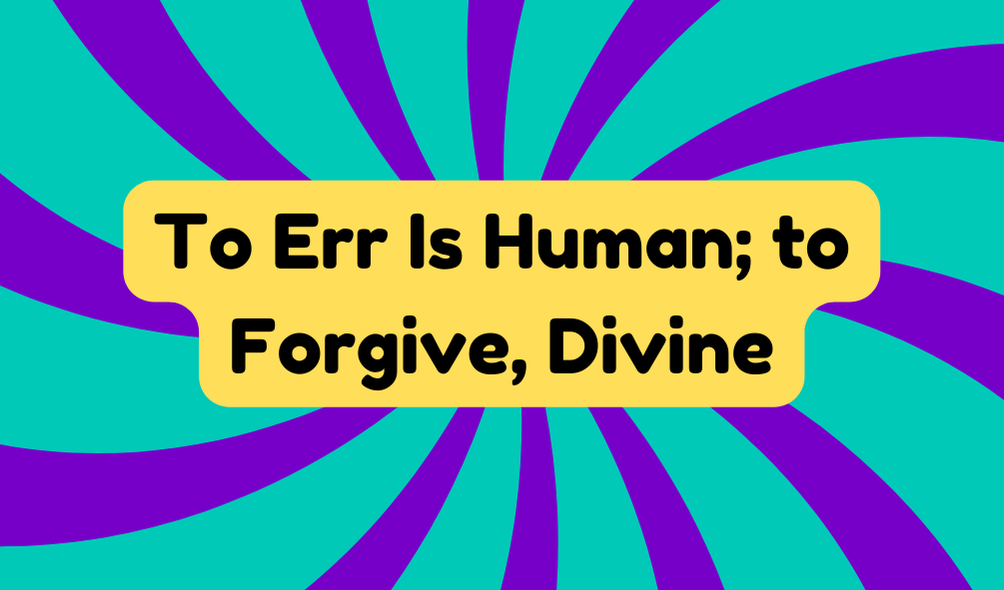The phrase "To err is human; to forgive, divine" highlights the reality of human mistakes and the noble act of forgiveness. It suggests that while everyone makes errors, the ability to forgive is a more elevated quality. Understanding this concept is essential for healthy relationships, as it promotes empathy and healing. In a world often quick to judge, this phrase serves as a reminder of the power of compassion. Further exploration reveals its ongoing significance in today's society.
Synonyms
Forgiveness, an essential aspect of human relations, often requires an understanding of its synonyms to fully grasp its significance. Considering human fallibility, these synonyms evoke a compassionate response towards others' shortcomings.
- Mercy illustrates kindness in judgment.
- Pardon signifies a release from blame.
- Absolution represents a formal forgiveness.
- Clemency embodies leniency in tough situations.
Each term deepens the emotional resonance of forgiveness, highlighting the need for empathy in interpersonal dynamics. Exploring these synonyms encourages individuals to confront their own judgments and biases, recognizing that understanding requires effort and a willingness to view errors as opportunities for compassion rather than condemnation.
Example of Sentences
Compassion often takes a backseat in discussions about human interactions, especially when it comes to the concept of forgiveness. Understanding how forgiveness impacts relationships exposes the intricacies of human nature. Sentences illustrating this include:
- "Despite the betrayal, she chose forgiveness, acknowledging the human nature of mistakes."
- "His refusal to forgive showed a lack of understanding about the forgiveness impact on healing."
- "Real progress in relationships often hinges on the ability to forgive."
- "By embodying forgiveness, they displayed an awareness that everyone errs."
These examples reveal the transformative power of forgiveness amidst the imperfections of humanity.
Origin
The phrase "to err is human; to forgive, divine" carries a historical weight that is often overshadowed by its contemporary use in discussions about empathy and human flaws. Originating from Alexander Pope's poem "An Essay on Criticism" in 1711, this expression illustrates the phrase evolution and highlights cultural significance. It emphasizes the distinction between inevitable human mistakes and the noble act of forgiveness. By recognizing this origin, readers can appreciate how the phrase has transformed over centuries, entering various dialogues about morality and compassion while maintaining its crucial role in advocating for understanding and empathy in society's complex interactions.
Collocations
Collocations surrounding the phrase "to err is human; to forgive, divine" reveal the nuances of how language expresses human experience and morality. The interplay of words emphasizes the complexities of the forgiveness process and human nature, encouraging contemplation on the duality of error and mercy. This inextricable relationship elicits various emotional responses, such as:
- The warmth of understanding in wrongdoing.
- The relief found in letting go of grudges.
- The poignant realization of collective fallibility.
- The transformative power of forgiveness.
These aspects inspire a reevaluation of societal norms, highlighting the urgent need for compassion in traversing our shared human experiences.
How to Use in Everyday Language
Understanding how to incorporate the phrase "to err is human; to forgive, divine" into everyday language can enhance communication and foster empathy in various social situations. By openly acknowledging that everyone makes mistakes, individuals can encourage an atmosphere where forgiving mistakes becomes commonplace. This approach emphasizes embracing empathy, helping create connections among people. In discussions, using this phrase can remind others of the importance of compassion. It serves as a gentle nudge to reflect on perspectives that may be overlooked. Integrating this wisdom into daily conversations elevates interactions, fostering mutual understanding and reinforcing the heart of human relations.
Why Is It Still Relevant Today?
Why does the phrase "to err is human; to forgive, divine" continue to resonate in today's society? Despite advancements in technology and communication, the fundamental aspects of human nature remain unchanged. Acknowledging the forgiveness importance in interpersonal relationships fosters greater empathy and understanding among individuals. In an era often marked by harsh judgment, the call for compassion emerges as especially relevant. Society can overlook the inevitability of mistakes, causing division rather than unity. Hence, this phrase serves as an essential reminder of the necessity for forgiveness, illustrating the potential for growth and healing amidst human imperfection.







